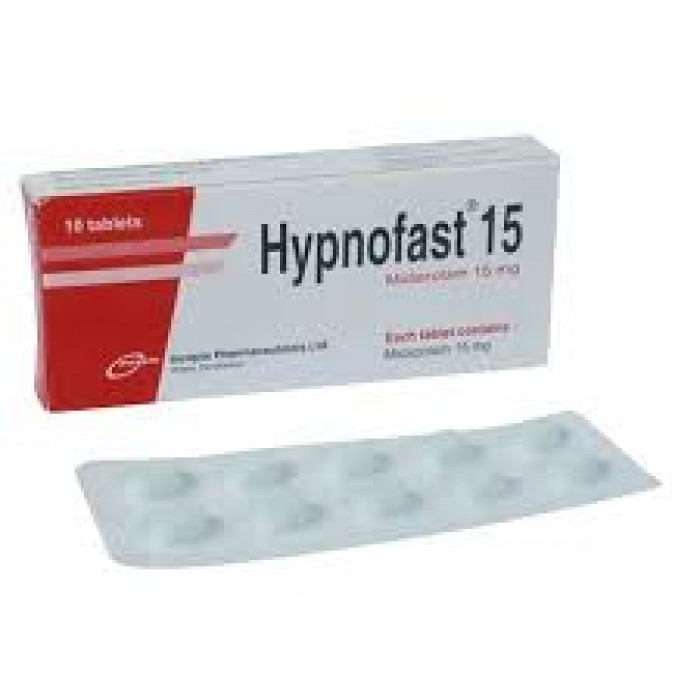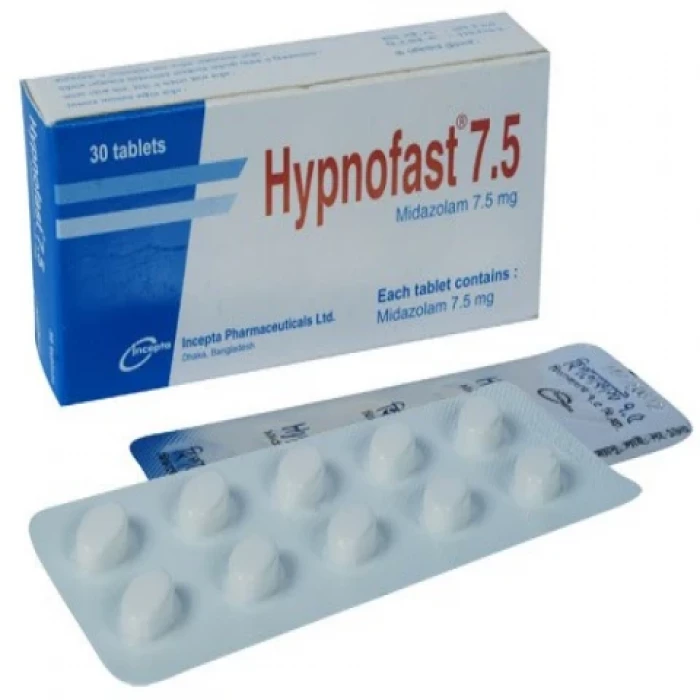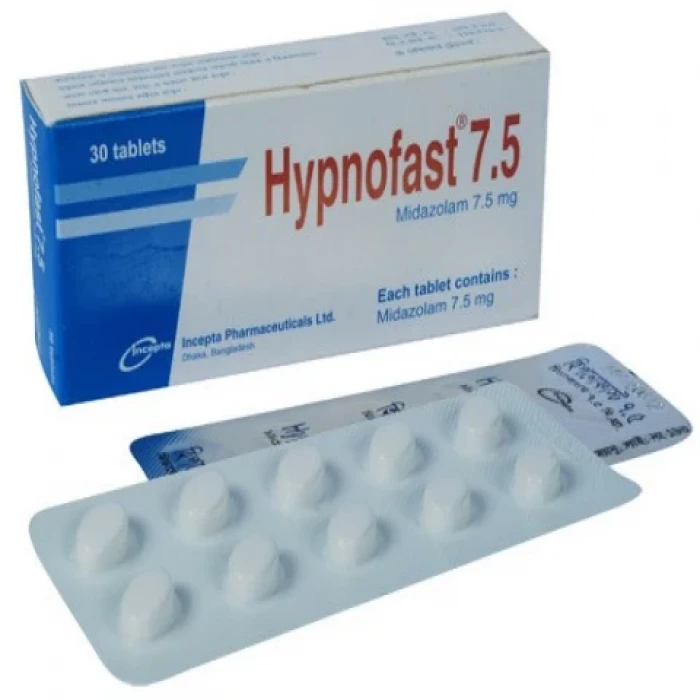
✔ 100% Authentic Product
👁️ Currently Viewing 2540
Hypnofast 15mg Tablet
Hypnofast 15mg Tablet finds application in inducing anesthesia and providing conscious sedation during medical procedures for diagnostics or treatment.
📄Prescription Required
Discount
Price: ৳ 141
MRP:
৳
150
6%
Off

100% Genuine Products, Guaranteed

Safe & Secure Payments, Always

Fast, Secure & Efficient Delivery

Proper Packaging
 Cash on Delivery - All over Bangladesh
Cash on Delivery - All over Bangladesh Regular Delivery - 12-24 Hours, Dhaka City* Charge Tk.39-59
Regular Delivery - 12-24 Hours, Dhaka City* Charge Tk.39-59 Regular Delivery - 24-48 Hours, Other Cities* Charge Tk.99-110
Regular Delivery - 24-48 Hours, Other Cities* Charge Tk.99-110
 ফ্রি ডেলিভারিঃ - ৯৯৯ টাকা+ অর্ডারে, ঢাকা
শহরে
ফ্রি ডেলিভারিঃ - ৯৯৯ টাকা+ অর্ডারে, ঢাকা
শহরে ফ্রি ডেলিভারিঃ - ২৯৯৯ টাকা+ অর্ডারে, ঢাকার
বাহিরে
ফ্রি ডেলিভারিঃ - ২৯৯৯ টাকা+ অর্ডারে, ঢাকার
বাহিরে
100% Genuine Products, Guaranteed
Safe & Secure Payments, Always
Fast, Secure & Efficient Delivery
Proper Packaging
 Cash on Delivery - All over Bangladesh
Cash on Delivery - All over Bangladesh Regular Delivery - 12-24 Hours, Dhaka City* Charge Tk.39-59
Regular Delivery - 12-24 Hours, Dhaka City* Charge Tk.39-59 Regular Delivery - 24-48 Hours, Other Cities* Charge Tk.99-110
Regular Delivery - 24-48 Hours, Other Cities* Charge Tk.99-110 ফ্রি ডেলিভারিঃ - ৯৯৯ টাকা+ অর্ডারে, ঢাকা
শহরে
ফ্রি ডেলিভারিঃ - ৯৯৯ টাকা+ অর্ডারে, ঢাকা
শহরে ফ্রি ডেলিভারিঃ - ২৯৯৯ টাকা+ অর্ডারে, ঢাকার
বাহিরে
ফ্রি ডেলিভারিঃ - ২৯৯৯ টাকা+ অর্ডারে, ঢাকার
বাহিরে
✅ Description:
Midazolam, a medication classified as a benzodiazepine, is employed to induce sedation, alleviate anxiety, and relax muscles. It is commonly used to induce drowsiness during medical procedures such as endoscopy or colonoscopy, a practice referred to as procedural sedation and analgesia. In this technique, Midazolam increases the activity of GABA, a neurotransmitter that acts as a natural nerve-calming agent in the brain, resulting in muscle relaxation, anxiety reduction, and drowsiness.
Midazolam should always be administered by a healthcare professional and should not be self-administered. Potential side effects may include redness, pain, or swelling at the injection site, headache, drowsiness, dizziness, confusion, dry mouth, tiredness, or muscle spasms. Most of these side effects are generally mild and tend to resolve over time. However, if they persist or worsen, it is advisable to consult with a healthcare provider.
Inform your doctor if you are allergic to Midazolam or any other medications if you are pregnant or planning to become pregnant, and if you are breastfeeding, as Midazolam may be excreted in breast milk. Caution should be exercised when using Midazolam in elderly patients, as they are at an increased risk of fractures and falls. Additionally, special care is needed when administering Midazolam to children. Alcohol consumption should be avoided during Midazolam treatment, as it can intensify the sedative effects. Driving is not recommended if Midazolam causes drowsiness or impairs concentration and coordination, as it may be considered an offense. Therefore, refrain from driving if you experience drowsiness after taking Midazolam.
Safety Advices

Alcohol
UNSAFE
Consumption of alcohol should be avoided when taking MIDAZOLAM, as it can heighten the sedative effects of the medication and potentially lead to breathing difficulties.

Pregnancy
CONSULT YOUR DOCTOR
If you are pregnant or planning to become pregnant, it is essential to inform your doctor before using Hypnofast 15mg Tablet. Prolonged use of Hypnofast 15mg Tablet during the last trimester of pregnancy may lead to physical dependence and the risk of withdrawal symptoms in the baby after birth.

Breastfeeding
CONSULT YOUR DOCTOR
Hypnofast 15mg Tablet may be present in breast milk. To prevent potential exposure to the medication, it is advisable to avoid breastfeeding for 24 hours after taking Hypnofast 15mg Tablet.

Driving
UNSAFE
Hypnofast 15mg tablet can induce drowsiness, impair concentration, and affect coordination. It is considered an offense to operate a vehicle after taking Hypnofast 15mg Tablet, especially if it impairs your ability to drive. Therefore, refraining from driving is crucial if you experience drowsiness following Hypnofast 15mg Tablet use.

Kidney
CONSULT YOUR DOCTOR
Similarly, if you have kidney problems, it is essential to inform your doctor before using Hypnofast 15mg Tablet.

Liver
CONSULT YOUR DOCTOR
If you have liver-related conditions, it is important to inform your doctor before taking Hypnofast 15mg Tablet.
✔️ Uses of Hypnofast 15mg Tablet
- Conscious sedation during diagnostic or therapeutic procedures
✔️ How does Hypnofast 15mg Tablet work?
Midazolam is a benzodiazepine. It works by increasing the action of a chemical messenger (GABA) which suppresses the abnormal and excessive activity of the nerve cells in the brain.
✔️ Side Effects of Hypnofast 15mg Tablet
At the initiation of treatment, individuals might experience drowsiness, disorientation, fatigue, headaches, and muscle weakness, but these side effects typically diminish with continued dosing. Administration of Midazolam through intravenous (IV) or intramuscular (IM) injection has been associated with changes in vital signs, including respiratory depression, temporary cessation of breathing, fluctuations in blood pressure, and variations in pulse rate.
✔️ Quick Suggestions:
- The addiction / habit-forming potential of this medicine is very high. Take it only as per the dose and duration advised by your doctor
- It may cause dizziness. Do not drive or do anything that requires mental focus until you know how this medicine affects you.
- Avoid consuming alcohol as it may increase dizziness and drowsiness.
- Inform your doctor if you are pregnant, planning to conceive, or breastfeeding.
- Do not stop taking medication suddenly without talking to your doctor as that may lead to nausea, anxiety, agitation, flu-like symptoms, sweating, tremors, and confusion.
✔️ What is Conscious Sedation?
This technique involves the administration of drugs to induce relaxation (sedative), reduce anxiety, and block pain (anesthetic) during a medical test or procedure. While under the influence of these drugs, you will remain awake but may not have the ability to communicate verbally. This approach is commonly known as procedural sedation and analgesia.
✔️ Pharmacology
Benzodiazepines like midazolam exert their effects by enhancing the action of the inhibitory neurotransmitter gamma-aminobutyric acid (GABA), which plays a crucial role in inhibiting neuronal activity in the central nervous system. This action results in sedation, and relaxation of skeletal muscles, and can lead to sleep, anesthesia, and temporary memory loss. Benzodiazepines achieve this by binding to specific sites on GABA-A receptors known as benzodiazepine sites, thereby increasing the frequency of chloride channel opening. This mechanism potentiates the calming effects of GABA. While GABA-A receptors are present in various human tissues, they are most concentrated in the central nervous system.
✔️ Dosage & Administration of Hypnofast 15mg Tablet
Dosage recommendations for Midazolam are as follows:
Oral Dosage:
- For adults: 7.5-15 mg daily.
- In elderly and debilitated patients: The recommended dose is 7.5 mg.
- For premedication: 15 mg of Midazolam should be given 30-60 minutes before the procedure.
✔️ Interaction
Midazolam has the potential to interact with a variety of medications, including:
- Neuroleptics: These are antipsychotic medications often used to treat conditions like schizophrenia. Combining them with Midazolam can enhance their effects.
- Tranquilizers: Medications that help reduce anxiety and promote relaxation. When taken with Midazolam, they can have a synergistic effect, leading to increased sedation.
- Antidepressants: Drugs used to treat depression and anxiety disorders. Their effects may be potentiated when combined with Midazolam.
- Sleep-Inducing Medications: Combining Midazolam with other sleep aids can lead to increased drowsiness and sedation.
- Analgesics: Pain-relieving medications, especially opioids, can have their effects enhanced by Midazolam, potentially leading to greater pain relief but also increased risk of respiratory depression.
- Anesthetics: Midazolam is commonly used as a pre-anesthetic medication to induce relaxation and amnesia before surgery.
- Antipsychotics: Medications used to treat psychotic disorders. Combining them with Midazolam can lead to increased sedation and cognitive impairment.
- Anxiolytics: Drugs that reduce anxiety. Their effects may be enhanced when used alongside Midazolam.
- Antiepileptic Drugs: Medications to control seizures. When combined with Midazolam, they can lead to increased sedation and may affect seizure control.
- Sedative Antihistamines: These are medications often used for allergies that have sedative effects. When taken with Midazolam, they can enhance sedation.
✔️ Contraindications
Patients with severe respiratory insufficiency, severe hepatic insufficiency, myasthenia gravis, sleep apnea syndrome, or known hypersensitivity to benzodiazepines or any component of the medication should not be given midazolam.
✔️ Pregnancy & Lactation
Unless there is no other option, midazolam should be avoided during pregnancy. Because midazolam travels through breast milk, it should not be given to nursing women.
✔️ Precautions & Warnings
Midazolam should be used with caution or avoided under the following conditions:
- Patients with Heart Failure: Caution is advised in patients with heart failure, as Midazolam may depress cardiac function.
- Impaired Gag Reflex: Midazolam can impair the gag reflex, which may be problematic in certain medical conditions.
- Respiratory Diseases: Patients with respiratory diseases should be monitored closely as Midazolam can lead to respiratory depression.
- History of Alcohol or Drug Abuse: Patients with a history of alcohol or drug abuse may be at a higher risk of developing dependence on Midazolam.
- Patients at Risk of Falls: Midazolam can cause drowsiness and muscle weakness, increasing the risk of falls, especially in the elderly.
- Hepatic and Renal Impairment: Dosage adjustments may be necessary in patients with impaired liver or kidney function.
- Children, Elderly, and Debilitated Patients: These patient populations may require lower doses and closer monitoring.
- Pregnancy and Lactation: The use of Midazolam during pregnancy and breastfeeding should be carefully considered, and only used if the potential benefits outweigh the risks.
- Avoid Abrupt Withdrawal: If Midazolam has been used for an extended period, abrupt discontinuation should be avoided to prevent withdrawal symptoms.
- Avoid Rapid Injection in Neonates: In neonates, Midazolam should not be rapidly injected to avoid adverse effects.
Patients should be informed that Midazolam may impair their ability to drive or operate machinery. Monitoring of respiratory and cardiovascular status, as well as blood pressure, is important during Midazolam therapy. In cases of lactation, caution should be exercised as Midazolam is distributed in breast milk.
✔️ Storage Conditions
Protect from light and moisture, store in cool and dry place. Keep out of the reach of children.
⚠️Disclaimer:
At ePharma, we’re committed to providing accurate and accessible health information. However, all content is intended for informational purposes only and should not replace medical advice from a qualified physician. Please consult your healthcare provider for personalized guidance. We aim to support, not substitute, the doctor-patient relationship.











